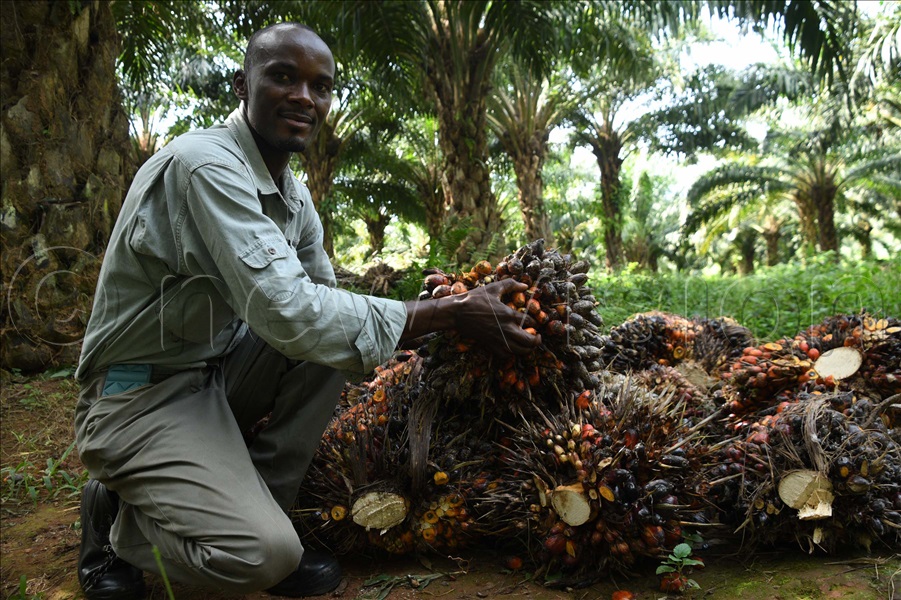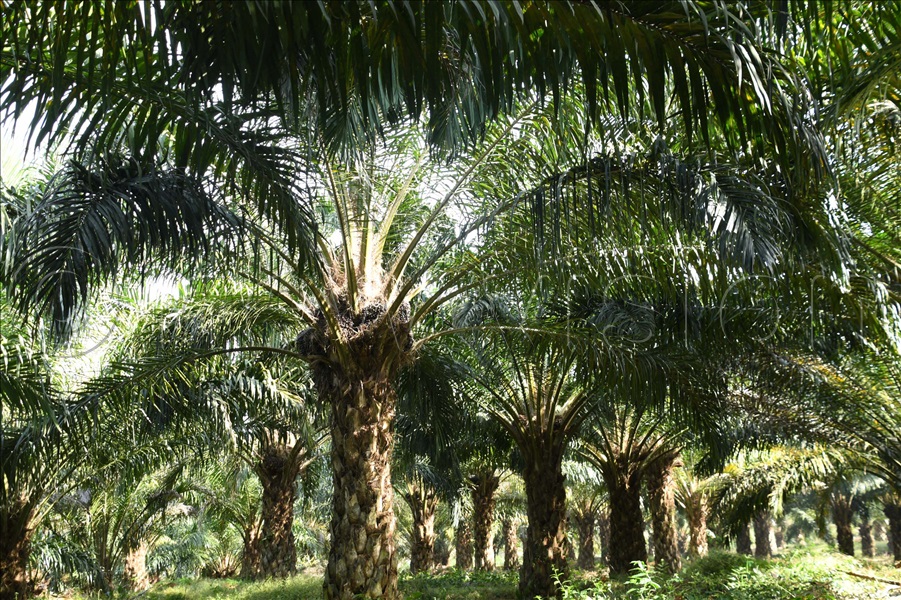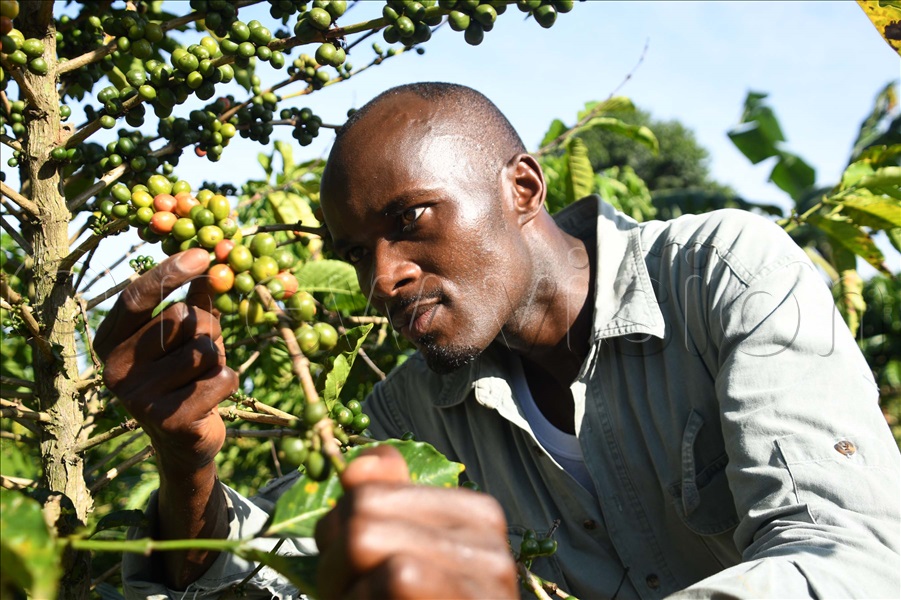By Joshua Kato
An early morning telephone call came in when Godfrey Musanje was working on his farm in Kalangala district.
“Musanje, how are you,” the caller asks.
“Fine and you? But let me first park the car before we can talk,” he says.
“What has changed in your life ever since you emerged as a best farmer in 2015?” the caller asks.
“This is one of the changes…” “Which change?” the caller asks.
“I own a vehicle,” he says jokingly.
Buying a car may not be a big deal for some people, but for Musanje, it is a testimony of how far he has come.

Musanje does not only have a personal car, but also a truck to cater for his farm’s transport needs. His oil palm acreage has increased from 40 to 48 acres.
He has also diversified into coffee with five acres, a coffee nursery bed and dairy cattle.
In 2015, Musanje was nominated for the Best Farmers Competition and he emerged as one of the winners.
He travelled to the Netherlands in 2016 as part of the prizes.
“Winning the Best Farmers’ Competition and the subsequent trip to the Netherlands opened my eyes to many opportunities. When I came back, many people thought I had been given a lot of money and so I had to work harder in order not to embarrass myself and the sponsors,” he says.

Musanje says he may not have replicated everything he learnt from Netherlands, but he picked major lessons.
Background
Musanje dropped out of school in Senior Two. He worked hard to find his own employment and now his farm is a beehive of activity.
In 2001, Musanje, upon completion of his Senior Two at Naluzane Secondary School in Masaka district, decided to enrol for an agricultural course specialising in crop husbandry at St Urusula Farm School in Masaka district.
He was in his late teens.
“I had to take farming seriously,” he says as he moves about his oil palm plantation in Kizira unit, Kayunga sub-county in Kalangala district.
Musanje says he was encouraged to join the oil palm project in 2005 by the district agricultural officer, David Balironda, together with his team which included Nelson Basaalidde, now the manager of Kalangala Oil Palm Growers’ Trust.
The team moved around the district explaining to farmers to get organised to benefit from a ‘new project’ that was about to be launched in their area.

“I decided to attend the training because I had realised that cutting down trees for timber was not sustainable,” Musanje says.
He had engaged in the timber business between 2005 and 2007.
“We gradually switched from timber to oil palm because it was a new crop, which we embraced cautiously in the initial stages,” he says.
Musanje says together with his elder brother, Jackson Kisolo, they owned 15 acres and it was this land that they cleared to plant oil palm.
“The land was in bibanja, but we have since processed the title deeds using the proceeds that we got from selling the harvested fresh fruits,” he says.
From the 15 acres that they started with, today Musanje and his brother; Kisolo,40, own a total of 48 acres, all covered with mature oil palm trees. This is up from 40 acres six years ago.
Because of his hard work, according to the project managers, Musanje, today ranks high among the most successful farmers who are ever willing to learn how to improve on the project’s implementation.
Everything about this 35-year-old’s agricultural practices speaks of a farmer who is enjoying what he is doing.
He says any farmer who wants to engage in oil palm cultivation should prepare their land in December to January in preparation for the first planting season, and May to June for the second season.
Oil palm requires rainfall amounts above 1,800mm per annum, which is evenly distributed throughout the year and temperatures ranging between a minimum of 22-24 degrees and a maximum of 29-33 degrees centigrade.
“After clearing our land, we received seedlings and fertilisers as well as technical support from Kalangala Oil Palm Growers’ Trust since oil palm was a new crop in our area,” he says.
He adds: “This project was just timely because most of the trees had been cut down on the island.”
Oil palm pays
When he won in 2015, a kilogramme of palm oil was being bought by BIDCO Uganda at sh400. Today, it goes for sh900.
Musanje says oil palm is the only crop in Uganda where farmers are supported with the required inputs and upon harvest they are assured of a market. Musanje’s first harvest was 99kg of mature fruits in 2010 from the 15 acres.
Today, he harvests about 25 to 30 tonnes per month from 48 acres.
“The fact that this was a new crop, the fi rst harvest was not impressive, but it was a learning process and because of that our yields have since increased,” Musanje says.
He says oil palm is the most productive and efficient oil crop in the world, with an average yield of refined oil of 4.2 tonnes per hectare (2.4 acres).
It yields up to six times more than any other oilseed crop and provides a consistent, high and steady income to farmers for approximately 25 years. Prices vary based on fluctuation on the international market, but a farmer harvests three times every month and can earn a gross of sh800,000 and sh900,000 per acre, when the fresh fruit bunches are mature.
Musanje says an acre can yield 200kg to 250kg per season. This means that from 48 acres, he can get as much as 12,000kg per season.
He says they have used most of the proceeds from selling the fruits to process land titles for all their land and investing in other businesses like the construction of commercial structures in Masaka as well as Kalangala district.
“Because of farming, I have been able to build my own house,” he says.
Workers
Musanje employs seven people as casual labourers, who on top of maintaining his garden, look after other farmers, gardens in the district at a reasonable fee.
For each kilogramme of the harvested fruits, the labourers are paid sh50, and sh50,000 for each acre that is pruned.
Vegetable farming
In the Netherlands, Musanje visited one of the most extraordinary vegetable research centres, the Tomato World.
“They explained to us so many things. I realised that if I did things right, I would earn good money,” he says.
Besides, there was a scarcity of vegetables in Kalangala and other islands because most residents were engaged in fishing.
“When I came back from the Netherlands, I cleared over 10 acres and started growing tomatoes. I bought assila, which was the best variety at the time and yields were good,” he says.
Musanje grew tomatoes and started selling them on the islands.
“However, over time, I was affected by the poor market. I was applying good practices by buying the best seeds, but the returns were poor. Transporting the tomatoes to Masaka was increasing the cost and so I had to reduce a bit,” he says.
Dairy farm
In 2015, Musanje had some cattle, mainly local breeds that would graze among the palm trees to keep the grasses low. Today, he has changed to keeping dairy cattle.
“I visited several dairy farms in the Netherlands and was impressed. I saw cattle producing 40 litres of milk per day. I decided to change from keeping local cows to improved breeds,” he says.
To turn it into a real commercial enterprise, the cows were moved to the mainland.
“We moved them from Kalangala to Masaka at a place called Kalinga. It is now an enterprise of its own,” he says.
He co-owns this land with his brother Jackson Kisolo.
He currently has 10 dairy cows under the project. Musanje explains that he moved the cows because it was no longer conducive to graze them under the oil palm trees.
Musanje’s coffee farm
Although Musanje was earning from oil palm, he decided to add some other income-generating activities.
Four years ago, he started a coffee nursery bed on a rented piece of land in Masaka city.
“I saw a need for quality coffee seedlings for farmers in Kalangala and this is why I started this project,” he says.
He has an annual production of 10,000 seedlings.
“Last season, we sold 5,637 seedlings to farmers in Kalangala and another 2,500 to farmers in Bukomansimbi,” he says.
Each seedling goes for sh5,00. To demonstrate that his seedlings are good, he also decided to start his own coffee shamba.
“I planted five acres of coffee three years ago in order to diversify my farm earnings,” he says.
The shamba started yielding in August 2022.
“Our first harvest yielded 194kg,” he says proudly.
Coffee yields more as it matures. An acre can yield as many as 1,200kg.
“I processed the harvest into parchment (kase) before selling it. It grossed sh620,000. Not so much but inspiring because it was the first,” he says.
Achievements
In the last six years since he won, Musanje has seen a drastic positive change in his life. Among others, he constructed a respectable residential house, bought two vehicles and acquired more land.
“I have a personal car and a truck that I use to transport farm inputs and produce. I have also been able to buy more land both in Masaka and Kalangala,” he says.
Plans
Musanje plans to expand both the coffee and oil palm shambas.
“I plan to grow my coffee shamba to 10 acres and maintain it well so that I earn good money,” he says.
Musanje says as far as value addition is concerned, a new coffee processing factory has been set up in Kalangala. “I will add value to my coffee from that factory,” he says.
What others say about Musanje
Anthony Wanyoto of national oil palm project
The success of farmers like Musanje under the oil palm project shows that whereas there were doubts about the project at the beginning, it has actually helped many people on the islands who did not have a stable sources of income to thrive. Other people can take lessons from Musanje.
John Mugwanya, fisher man and farmer in Kalangala
I have seen how far he has gone and as a fellow farmer, I have learnt lessons from him. When you are consistent, you can actually fight poverty. Many of us had reservations about this project, but we can now see that it pays.
Lovinza Ssebunza, Kalangala resident
Musanje took up this project at the time when some people doubted it. The results are there for all to see now. He expanded from a few acres to over 40, he even travelled to Europe because of growing oil palm.





